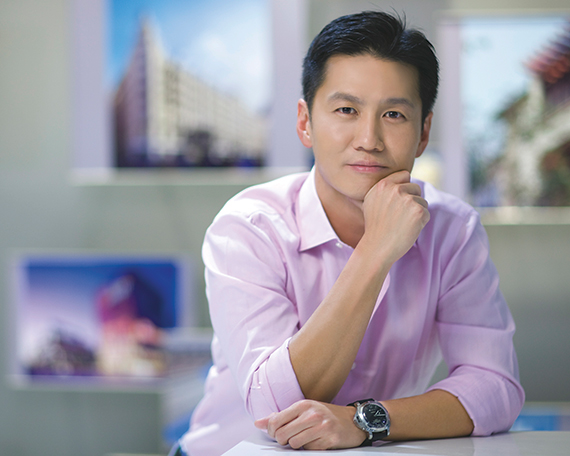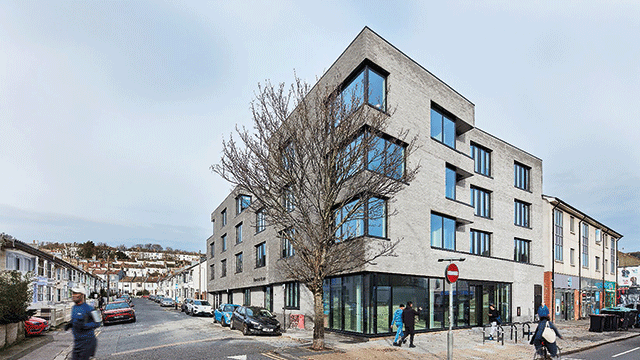
Goodwin Gaw has become the poster boy for fronting Asian capital to Western markets and Western capital to Asia, the US and Europe. His business, Gaw Capital, has invested almost A$12bn (£6.4bn) for its separate accounts and co-mingled funds since its inception in 2005. Here he tells David Hatcher what it is like to run a business with your siblings, why agents in London need to buck up their ideas, and reveals his favourite places to eat in Hong Kong
What is it like working with your brother and sister?
It’s interesting. It’s not a family business in the traditional sense, because it’s not a business we inherited, but one we started.
We’re fortunate that the three of us have such complementary skill sets, so we get to lean on each other a lot. Once I pass something on to my brother Kenny, it is out of my mind completely and I can focus on something else. Christina is a people person, so she’s good with investors. She is an advocate for the investor. She is always saying, ‘Investors want this and want that, so you guys need to do a better job with this, otherwise I will look bad.’ She’s the real boss.
 You have seven offices. How do you divide your time?
You have seven offices. How do you divide your time?
We have a big team now, so I tend to go where the deals are. If there is a new market where we want to expand, I visit because we put our own capital investment in and need to closely examine those new opportunities.
Where are those new markets you are looking into?
Vietnam is interesting. We made our first investment there two years ago. And China is raising wages because they want to push up domestic consumption, which they have been successful in doing. But because of that, factories in China are becoming non-competitive and, especially in the textile industry, if you ask where the place to open factories is, they will say Vietnam. The infrastructure, quality and productivity, it’s all benefiting from the exodus of factories from China.
What’s your favourite place to travel for pleasure?
I still like old Europe, the culture and the history. My best experience recently was Soho House’s version of the quintessential English countryside, the Farmhouse, [in Chipping Norton, Oxfordshire]. It’s like you get into the picturebook of the British countryside – a little wet, a little muddy, but without having to do all the work.
You’ve just bought your UK headquarters in Clerkenwell, EC1. Is that an unusual location for Gaw?
I cut my teeth doing a lot of these types of development – something a bit edgy. My first project, which started my career, was the Roosevelt Hotel in Hollywood, Los Angeles. It was very seedy, but the redevelopment of that helped the whole evolution of the area, and then we started buying up empty buildings in Downtown Los Angeles, which helped kickstart the area’s living environment and make it more of the 24-hour city it is now.
We’re looking for that type of opportunity.
Are large Far Eastern and Chinese institutions eager to take on that type of project?
I think you will see risk appetite increase as they get comfortable with London. More roll-up-your-sleeves redevelopment and gentrification projects in edgier areas, rather than just West End, City or Canary Wharf. But these are not players who are looking to buy, sprinkle some dust on it and then sell. That’s not the strategy. It’s more like 10 or 20 years.
Do you think UK investors and advisors underestimate how savvy investors from the region are?
I think there was a reason I got very bullish on London. That was the attitude I saw, so I knew there would be room. A bit of the culture difference, or maybe a bit of the arrogance, created the opportunity.
London is a bit of an old school old boys’ network, so many of them have a lot of value to add, but some of them are just too confident, resting on their laurels. Ultimately, if you add value people will pay you – eastern investor or western investor. But if you are just redirecting a brochure to me, then with the internet and transparency of knowledge…
Gaw is seen as a transporter of Asian capital westward. Is that still the focus?
The world is getting more global. We have investors from Europe and the US – insurance companies and pension funds – investing with us in Asia, and obviously most of our Asian funds are made up of 80% western investors into Asia.
A lot of our activities in the US and Europe have more Asian investors involved, but our US strategies are 50:50 domestic US investors and foreign investors through our co-mingled funds.
How important is brand?
I really believe in the value of brand. Our primary goal is to be a fiduciary; to make money for investors, but if we have made a difference to the building, the neighbourhood and the people who use it, the financial reward always comes. It’s not about making a legacy for ourselves, it’s about leaving a legacy for the projects.
Last October you bought the Intercontinental Hong Kong alongside Korea Investment Corporation for $938m. What drew you to it?
It’s one of the most iconic hotels in the world, a key piece of Hong Kong’s skyline. We’re going to work to bring back some of the shine it has lost.
There are lots of glitzy new hotels, like the Ritz-Carlton and the Four Seasons, but the Intercontinental’s location and the view from every window is impossible to replicate.
The restaurants are amazing. Spoon [by Alain Ducasse] and Nobu are there, and most people in Hong Kong would say it has the best steakhouse [the SteakHouse Winebar + Grill]. Most people will tell you they go to Kowloon four times a year just to eat at the steakhouse. It’s the only charcoal grill in Hong Kong.
So have you only bought the hotel to get a discount at the restaurants?
I don’t get a discount, but I guess it’s a little bit of net profit. I end up having to pay a lot, because all my friends say: “Oh, you are part of the ownership now, so you are taking us to dinner.”
I’m starting to think it’s getting to be a pretty expensive investment.
• To send feedback, e-mail david.hatcher@estatesgazette.com or tweet @hatcherdavid or @estatesgazette










